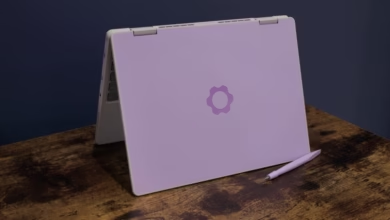Framework Desktop Review: A Hybrid of PC and Mac Studio

▼ Summary
– Framework is known for its modular, upgradeable laptops, with the Framework Laptop 13 receiving multiple iterations in under five years.
– The company is expanding into desktops, but the Framework Desktop lacks the modularity and upgradeability of its laptops or self-built PCs.
– The Framework Desktop is more compact and better designed than some no-name mini desktops but sacrifices performance and upgradability for size.
– Despite its small size, the Framework Desktop’s DIY Edition requires minimal assembly, with pre-installed components like the heatsink and internal cables.
– The desktop’s packaging is eco-friendly, using entirely recyclable cardboard and paper, and its compact design allows three units to fit in a standard mini ITX case.
Framework has built its reputation on modular, repairable laptops, but their new desktop venture raises eyebrows by abandoning those core principles. While their laptops allow easy upgrades through swappable components, the Framework Desktop takes a puzzling turn, offering less flexibility than a standard DIY PC build while still carrying premium pricing.
The company made waves with its Framework Laptop 13, which lets users swap out motherboards and memory for newer models without replacing the entire device. That philosophy hasn’t translated to their desktop offering, which arrives as a compact, pre-configured system with limited upgrade paths. For enthusiasts who value customization, the Framework Desktop feels like a step backward, especially when compared to traditional tower builds or even mini-ITX systems.
At first glance, the design is sleek and thoughtfully packaged. The unboxing experience emphasizes sustainability, with recyclable cardboard and minimal plastic. Even the DIY Edition requires little assembly, with pre-installed heatsinks and connected internal cables. But while the compact 4.5-liter chassis is impressively small, three could fit inside a typical mini-ITX case, its size comes at a cost. Unlike Framework’s laptops, this desktop doesn’t prioritize future-proofing, leaving buyers with fewer expansion options than a standard PC.
Performance-wise, it’s a step above generic mini desktops powered by obscure AMD Ryzen AI Max chips. Yet, like many small-form-factor PCs, it forces a trade-off: Do you value portability and aesthetics enough to sacrifice upgradability and raw power? Gamers and power users might balk at the limitations, while casual users could find the premium hard to justify.
Framework’s shift into desktops is bold, but without the modularity that defined their laptops, it’s unclear who this machine is for. If you crave a tiny, eco-conscious PC and don’t mind locked-in specs, it’s an interesting option. But for those who expected Framework’s signature repairability, this desktop might feel like a missed opportunity.
(Source: Ars Technica)

